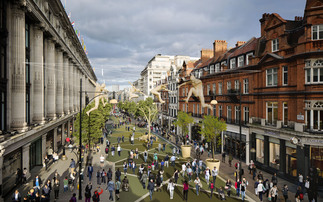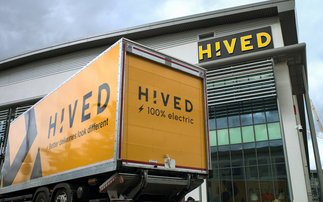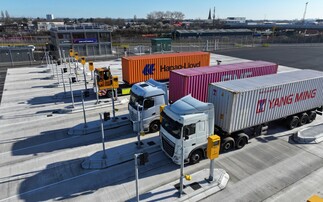Climate Change Capital chairman argues that the exciting clean technologies offered by the automotive sector prove green products can be better than the alternatives they replace
Last week, BusinessGreen chaired an event for the Sustainability Hub on the lessons the auto industry and its successful efforts cutting carbon emissions hold for the wider economy.
As part of the event, James Cameron, non-executive chairman of Climate Change Capital, gave a short speech on how the transport sector could provide a template for other clean tech industries to follow. Below is the speech in full:
"I have just come back from the BNEF summit in New York, which this year was very, very successful, with a huge turnout. More than 1,200 people turned up, more than they were planning for. The rooms were packed and there was a very optimistic feeling in the corridors, people were doing deals and were excited about the prospects for clean energy in particular - it was striking.
But it is also true that the story is not well told. So I am going to suggest that this particular sector, the transportation sector, is quite a good base for telling that story - a story that is essentially optimistic, positive, and corresponds with people's wants and desires.
There has been a tendency in the debate, certainly about climate change, to shape the conversation with fear. To essentially expect that we all have permanently pure motives for all our day-to-day decisions and that we can practise as individuals that which we hope might be practised by us all as a society. And often it is too much, and we feel defeated before we have got started.
So my suggestion is that if you look at the transportation sector there is enough in there that is alluring and attractive, and as such some of the elements of the green transformation that is under way provide tremendous encouragement for the rest of the low carbon space.
As it happens I am one of those boys who is attracted to cars, planes and trains, and I think there is something alluring about those objects. How they are designed, how they are made to look matters. How long they last, the sense of craftsmanship, the way something is built to last has many environmental messages within it, but they are not the overt case for buying the vehicle or admiring the shape of the train or the aerodynamics of a plane.
This is increasingly important psychologically in the transformation we must make - it has to be an alluring transformation.
But equally none of these objects, attractive though they may be on their own, makes any sense without being part of a system, and climate change is a system problem.
Most of the environmental challenges we face are systemic, they are not resolved by individual decisions. A single journey in a car is not a problem, millions of them all at the same time in the wrong kind of vehicles with the wrong kinds of fuels is a problem. It is a system problem.
And it is an infrastructure problem. One of the things I see emerging in this country now, and again it is not well told, is that some parts of these systems are starting to be reformed in really exciting ways.
So, for example, just take our world-leading science in materials. We are genuine world leaders in material science. You heard earlier about the composite materials cluster in Bristol, which is a brilliant place. But you may also remember the profile that was given, not least by the Chancellor, to graphene and its invention at the University of Manchester.
Now, one of my frustrations with the rhetoric around the environment and the economy is that - and it still bothers me to recall it - in that speech the Chancellor gave to the Conservative Party about how he was not going to wreck the economy by laying costs on the consumer from the environment, he started that speech by celebrating graphene. With a little bit more thought, and perhaps some better advice, he could have understood that graphene is a scientific breakthrough with huge potential for the low carbon transportation sector. Its main attribute when applied there is to take weight out of the system for moving goods and people. Probably the biggest single factor in turning a transportation system into an efficient system when people still want to fly in planes, drive cars, and be moved around in trains is weight.
Now if you were to take the scientific innovation around graphene and apply that in a transportation industry where we do still manufacture - and we manufacture to very high standards, standards that are pushed to the extremities by what appear to be very [environmentally] unsound enterprises like Formula 1, that actually hone a lot of engineering skills. You could then use that application to reach global markets that we aspire to reach as part of our growth strategy - a growth strategy where we target areas where we know there is demand and where we have a reputation we can trade on.
That way you can link the scientific innovation, with manufacturing skill, with value-added here, with global markets at scale - and that is environmental investment. It doesn't need an environmental label, but it is. And we have it here.
And one other thing to mention that we have here that we are very good at: we have a fantastic services sector. We have brilliant marketers, brilliant designers, brilliant engineers, we don't have enough of them, but we have them. If we can create the aspiration to own and use and to have those objects that we make here, that contain these advanced materials, then the growth markets that are buying and using vehicles in ever increasing numbers will aspire to own the vehicles that we design - vehicles that we put our brand on, that happen to be made in a way that dramatically reduces greenhouse gas emissions. But they won't have to be sold as low emission; they will just be beautiful, they will just be practical, they will just be better.
One of the things that really is alluring about the transportation sector as a guide to the rest of the economy is that it is perfectly possible to argue that the new stuff is better than the old stuff; that the technology has improved; that the use of the vehicle is better.
Just to make a trivial sideline argument, there is an argument raging in Formula One at the moment over the noise of the vehicles - they are not noisy enough apparently. But our very own Lewis Hamilton, winning the first two races of the year, declares transparently, with absolute innocence in his voice and not knowing the import of what he is saying: "this is the best car I have ever driven". That will start to resonate.
You can apply this reasoning, this combination of science and technology, build quality, export markets attached to brands that we can establish because we are good at this stuff, to lots of other sectors.
You can certainly do it in the built environment - a green building can be experienced as a better building to live and work in. It feel like progress, it doesn't feel like punishment.
Infrastructure systems that are easy to use because they have been built around achieving efficiency gains are more attractive. So, the notion of a more resource efficient economy - a phrase we like in a technical world that may not resonate particularly well with the world outside - has got to provide a sense that progress is being made and I am a part of it. I can make choices everyday that allow me feel like my life is improving, not as a punishment for past sins.
That is the narrative I would like to see emerge. The transportation sector is helping us build a positive, optimistic narrative about how life gets better, having solved some of these complex problems relating to the environment, even whilst we carry a different label and we barely mention that it is to do with the environment.
BusinessGreen was a media partner for the Sustainability Hub event, 'Green and growth: We can have both - lessons for road transport and other sectors'
A full report of the event will be published later this week







